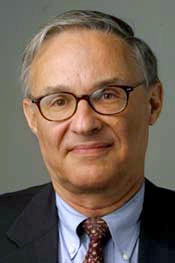Leon Kass | |
|---|---|
 | |
| Born | Leon Richard Kass February 12, 1939 |
| Education | University of Chicago (BS, MD) Harvard University (PhD) |
| Known for | President's Council on Bioethics from 2001 to 2005; appreciation of the natural; opposition to human cloning and euthanasia |
| Spouse | |
| Awards | Jefferson Lecture (2002) |
| Scientific career | |
| Fields | Bioethics, medicine, human rights |
| Institutions | University of Chicago |
Leon Richard Kass (born February 12, 1939) is an American physician, scientist, educator, and public intellectual. Kass is best known as a proponent of liberal arts education via the "Great Books," as a critic of human cloning, life extension, euthanasia and embryo research, and for his tenure as chairman of the President's Council on Bioethics from 2001 to 2005. Although Kass is often referred to as a bioethicist,[1] he eschews the term and refers to himself as "an old-fashioned humanist. A humanist is concerned broadly with all aspects of human life, not just the ethical."[2]
Kass is currently[as of?] the Addie Clark Harding Professor Emeritus in the College and the Committee on Social Thought at the University of Chicago, the Hertog Fellow at the American Enterprise Institute, and the Dean of the Faculty at Shalem College in Jerusalem. His books include Toward A More Natural Science: Biology and Human Affairs; The Hungry Soul: Eating and the Perfecting of our Nature; Life, Liberty, and the Defense of Dignity: The Challenge for Bioethics; The Beginning of Wisdom: Reading Genesis; and What So Proudly We Hail: The American Soul in Story, Speech, and Song.
"For his students and readers," Yuval Levin summarizes, "Leon Kass has laid out a path of inquiry showing that those questions that bedevil us most today have been with us for countless generations, and have to do not with the latest modern excess, but with man’s unchanging nature, wants, needs, and potential. It is a path...that opens with a question: How does man thrive?"[3]
- ^ "Leon Kass," Encyclopædia Britannica, 2009.
- ^ Leon Kass, interviewed by Francis Wilkinson, Discover, February 2008.
- ^ Yuval Levin, quoted in "A Guide to the Work of Leon Kass," Great Thinkers, [1]